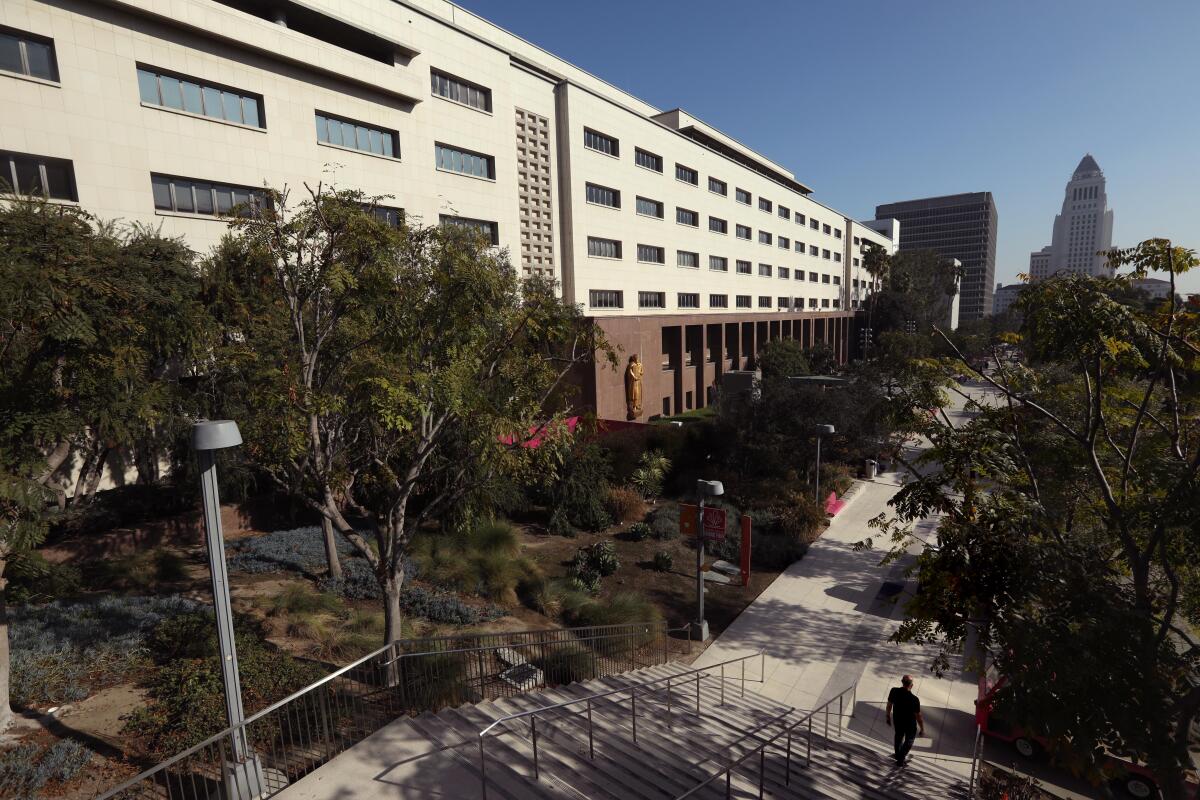L.A. County faces $2 billion in fire recovery costs, straining budget

- Share via
Saddled with about $2 billion in fire recovery costs and the largest sex abuse case settlement in U.S. history, the Los Angeles County government is facing about $89 million in budget cuts.
To close the budget gap, the county will have to leave hundreds of vacant positions unfilled, but no layoffs are expected, said Fesia Davenport, the county’s chief executive, at a news briefing Monday.
The fire recovery estimate includes $1 billion in lost revenue, mostly from property taxes, and $1 billion to cover soil testing, debris removal and beach cleanup and other costs, Davenport said.
The county can be reimbursed by the federal government for some of those costs, but must front the money. Davenport said the reimbursements for the January fires, which devastated Altadena, Pacific Palisades and surrounding areas, could take years.
L.A. County announced this month that it planned to pay $4 billion to settle nearly 7,000 claims of child sexual abuse that occurred in juvenile facilities and foster homes, most from the 1980s through the 2000s. If approved by the Board of Supervisors later this month, it will be the largest sex abuse claims settlement in U.S. history.
The $4 billion, if approved, would appear to dwarf the largest sex abuse settlements in U.S. history.
“We knew that the cost of the settlement would be unprecedented, and that it would have a devastating impact on our budget,” Davenport said at the briefing, where she unveiled the county’s roughly $48-billion recommended budget for the upcoming fiscal year.
The sex abuse claims arose from Assembly Bill 218, a 2020 state law that gave victims of childhood sexual abuse a new window to sue, even though the statue of limitations had passed. Thousands of men and women came forward saying they had been sexually abused as children while in county custody.
Davenport said the county expects to pay hundreds of millions of dollars every year until 2030, followed by smaller payments through 2051. In addition to taking out bonds, she said, the county will need to tap into its rainy day fund, which has about $1 billion in it.
“I cannot remember the last time we tapped into a rainy day fund,” she said.
Davenport added that home sales in L.A. County have declined by 41% since 2021, putting more pressure on the county budget, which relies heavily on property taxes.
In the city of Los Angeles, the top budget official has said that layoffs are “nearly inevitable,” with a budget shortfall of nearly $1 billion due in part to ballooning legal payouts, weaker than expected tax revenue and pay raises for city employees.
Faced with a nearly $1-billion budget shortfall, the Los Angeles City Council met behind closed doors to take a fresh look at its salary agreements with labor unions.
Under Davenport’s recommended spending plan, most county departments would make a 3% budget cut, and 310 vacant positions, out of about 117,000 budgeted positions, would be eliminated countywide. Davenport declined to say whether layoffs were anticipated in future years.
“When you start talking about layoffs prematurely, it makes people very nervous,” she said. “You start a rumor mill.”
The public works, regional planning and mental health departments, as well as the Sheriff’s Department, would be exempt from the cuts, according to a county spokesperson.
The Trump administration has further complicated the financial picture for L.A. County, which receives at least 13% of its budget from the federal government. The county Department of Public Health was recently notified that it would lose about $45 million in federal grants related to COVID-19, a decision that Davenport said has been blocked by a temporary restraining order, for now.
“The potential for federal funding cuts is very real and could destabilize the county’s budget,” she said.
Davenport said the recommended budget includes $1.1 billion in spending for homeless services through Measure A, a half-cent sales tax that voters approved in November, and $11.9 million for county government reform approved by voters last year through Measure G.
The Board of Supervisors will discuss the recommendations Tuesday, with the final budget to be adopted in September.
More to Read
Sign up for Essential California
The most important California stories and recommendations in your inbox every morning.
You may occasionally receive promotional content from the Los Angeles Times.













